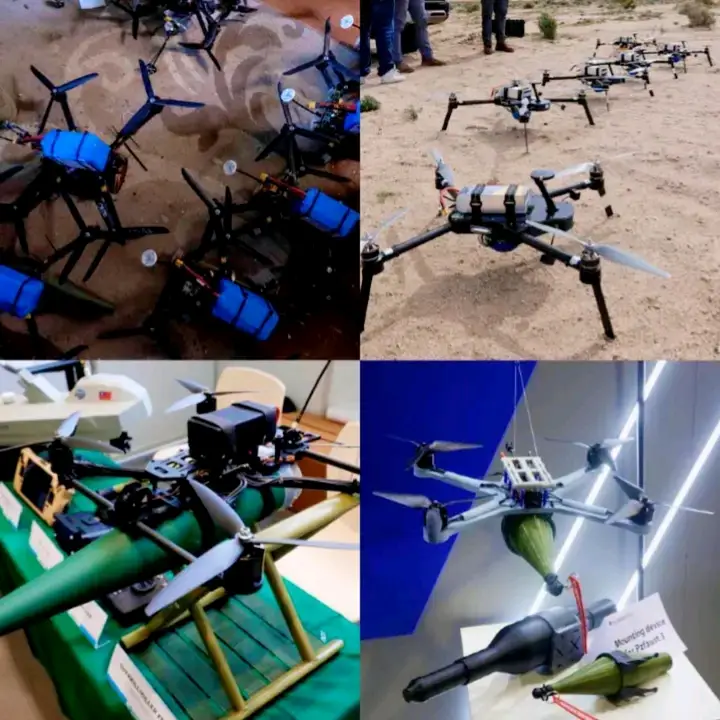
Nigerian military has begun production of attack drones to strengthen the fight against terrorism.

Nigerian military has begun production of attack drones to strengthen the fight against terrorism.

TROOPS RESCUE 10 KIDNAP VICTIMS, RECOVER ARMS, RANSOM IN KADUNA
Troops of Sector 5 under Operation PEACE SHIELD have successfully rescued 10 kidnapped victims in Kaduna State, marking a major breakthrough in the fight against banditry.
The victims, including one adult man, three male children, three elderly women, and three female children, were abducted on November 29, 2025, while working on their farms at Ungwan Nungu in Sanga Local Government Area.
The rescue operation was carried out on December 5, 2025, at around 6:40 a.m. when the troops engaged the kidnappers who had arrived to collect ransom from relatives of the hostages. The kidnappers were overpowered and fled into the surrounding forest, abandoning the victims.
The troops recovered a fabricated AK-47 rifle, a round of 9mm ammunition, and ₦1.6 million, which was part of the ransom. The rescued victims have been reunited with their families, bringing relief to the traumatized community.
The Nigerian Army has reaffirmed its commitment to protecting citizens, denying criminals freedom of action, and restoring peace across affected communities.

Troops Kill 4 Bandits, Arrest Police Collaborator in TarabaTroops of the 6 Brigade Nigerian Army have killed four armed militia members and arrested a police officer alleged to be collaborating with bandits terrorising the Karim Lamido Local Government Area of Taraba State.
The operation followed credible intelligence indicating a resurgence of long-standing land disputes between the Shomo and Wurkun communities, which escalated into armed clashes and destruction of property.
The troops responded swiftly, neutralising the attackers and recovering weapons, including dane guns, a fabricated AK-47 rifle, and ammunition.
The arrested police officer is undergoing investigation to determine his level of involvement. The Brigade commander commended the troops for their bravery and reaffirmed their commitment to restoring peace and stability in Taraba State.

Nigerian Military Kills Dozens of Terrorists, Arrests 57 Suspects – Defence Headquarters
The Nigerian military has made significant strides in combating terrorism and insecurity in the country. According to the Defence Headquarters, troops have neutralized dozens of terrorists, arrested 57 suspects, and rescued 45 kidnapped victims across the nation in just one week.
These operations were carried out in various regions, including the North East, North West, North Central, and South East, targeting terrorist groups like Boko Haram, ISWAP, and bandits. The military also recovered large caches of arms, vehicles, and ammunition, and dismantled several illegal oil refining sites.
The Defence Minister, Mohammed Badaru Abubakar, has expressed confidence that the armed forces are closing in on eliminating bandits terrorizing parts of the country. The Nigerian government has also declared a national security emergency, ordering the recruitment of thousands of additional police and military personnel to tackle the worsening insecurity.
These efforts demonstrate the military’s commitment to restoring peace and stability in Nigeria.
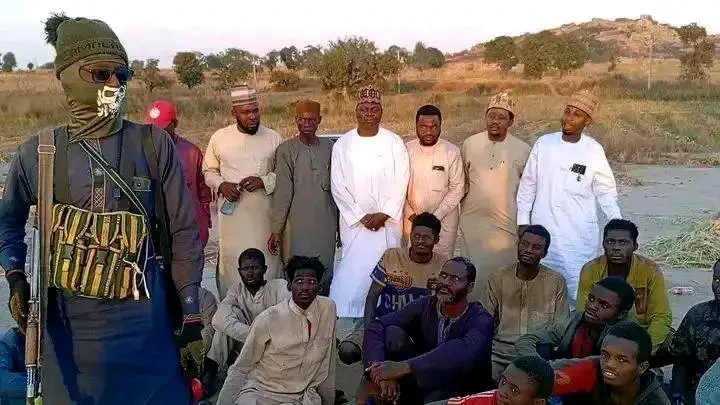
37 Kidnap Victims Freed in Katsina Peace Deal
In a significant breakthrough, 37 kidnap victims have regained their freedom in Katsina State, Nigeria, following a successful peace agreement between community leaders and armed bandits. The freed individuals, comprising 17 women, 2 children, and 18 men, were handed over to a delegation led by Hon. Ibrahim Kandarawa, a member of the Katsina State House of Assembly, and the Chairman of Bakori Local Government Area.





The peace deal was facilitated by Alhaji Isya Kwashen Garwa, a prominent Fulani leader, who played a crucial role in the negotiation process. The victims, who had been held captive for days, were released unharmed.
Hon. Kandarawa praised all parties involved in the agreement and assured residents that efforts would continue to strengthen peace and security in Bakori and surrounding communities. Community members have expressed relief over the development and are calling for lasting measures to end recurrent kidnappings and banditry in the region.
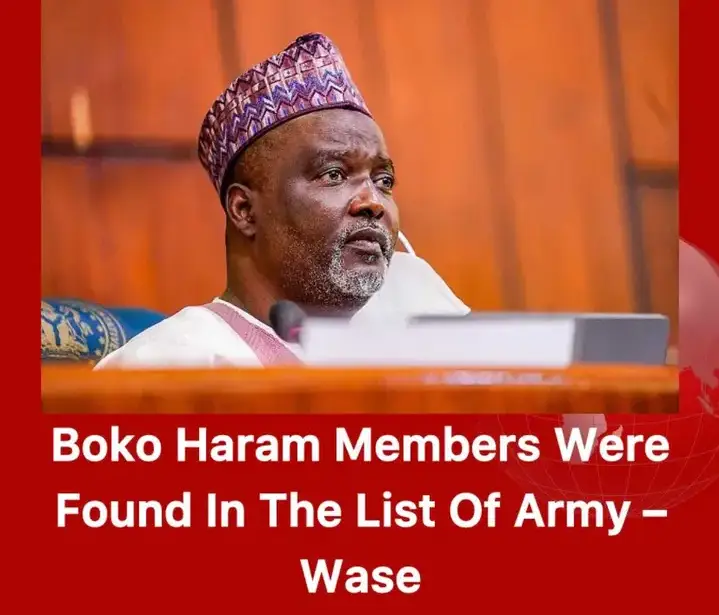
Former Deputy Speaker of the House of Representatives, Ahmed Idris Wase, has revealed a disturbing fact that Boko Haram members were found on the Nigerian Army recruitment list. This discovery highlights significant flaws in Nigeria’s recruitment processes, allowing individuals with criminal backgrounds to infiltrate sensitive security institutions.
Wase emphasized that this infiltration is a major reason Nigeria continues to struggle against insurgency, despite years of military efforts. He urged politicians to stop recommending individuals with questionable backgrounds into security agencies, stressing that having criminals in the system hinders efforts to resolve the security crisis.
The situation is dire, with kidnapping becoming routine and approximately N5 billion paid in ransom in a single year. Over 30,000 lives have been lost in Boko Haram-related attacks, and Wase himself lost a brother and cousin to terrorists.
Lawmakers are calling for a holistic approach to address the crisis, emphasizing the need for urgent, coordinated action. The Nigerian government has been working to tackle the Boko Haram insurgency, but these revelations underscore the challenges faced by authorities.
The Nigerian Army has denied recruiting repentant Boko Haram members, stating that only members of the Civilian Joint Task Force (CJTF) who distinguished themselves in the fight against terrorism were considered for recruitment.
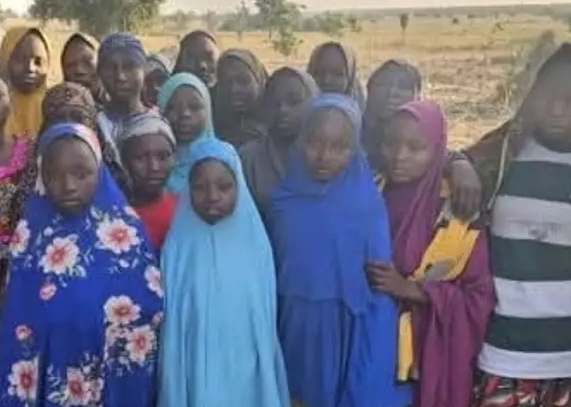
24 Kebbi Schoolgirls Rescued: A Major Breakthrough in Kidnap Saga
The 24 schoolgirls abducted from Government Girls Secondary School, Maga, in Kebbi State have been rescued, according to President Bola Tinubu’s statement on Tuesday. The girls were taken by bandits on November 17, and their rescue is a result of a coordinated effort by security agencies [1][2][3].
President Tinubu commended the security agencies for their swift response and urged them to intensify operations to free other students still being held by bandits. “I am relieved that all the 24 girls have been accounted for. Now, we must urgently deploy more boots on the ground in vulnerable areas to prevent further kidnappings. My government will provide all necessary support to achieve this,” he said [1][4].
The Minister of State for Defence, Bello Matawalle, had been directed to relocate to Kebbi State to coordinate the rescue mission, and his efforts, along with those of security agencies, led to the successful rescue [8].
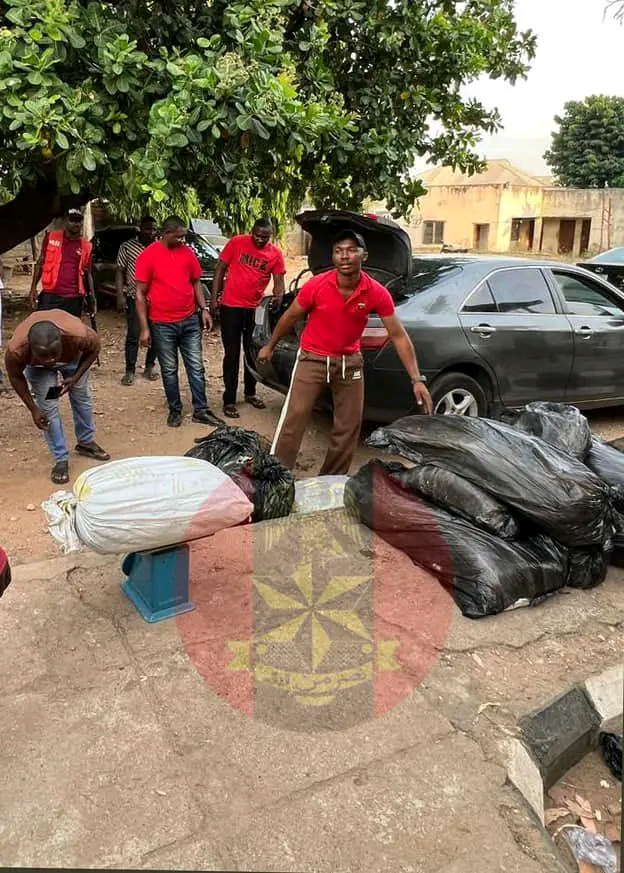
Major Drug Bust: Nigerian Army Seizes 108.8kg of Cannabis Sativa in Kogi State
The Nigerian Army has made a significant breakthrough in the fight against drug trafficking in Kogi State, intercepting a major consignment of Cannabis Sativa worth a substantial amount. The operation took place on November 24, 2025, when soldiers stationed at the Agbede Response Area conducted a routine stop-and-search on a Toyota Camry with registration number DKA 158AU.




The vehicle, driven by Mr. Johnson Ayo, raised suspicion after troops spotted a branded police hat and belt placed on the dashboard. A detailed search uncovered 10 sacks of Cannabis Sativa weighing 108.8 kilograms, carefully concealed inside the car.
Preliminary investigations indicate that the illicit shipment was part of a larger trafficking network believed to be financing criminal groups and contributing to the surge in banditry within Kogi and neighboring states. The suspect and seized items have been handed over to the National Drug Law Enforcement Agency (NDLEA), Kogi State Command, for further investigation and prosecution.
The Nigerian Army reiterated its commitment to dismantling drug trafficking routes, cutting off financial lifelines for criminal networks, and strengthening overall security across the state.

South-West Governors Launch Unified Security Initiative
The South-West governors have taken a significant step towards enhancing regional security. In a meeting held in Ibadan, they agreed to establish a South West Security Fund (SWSF) dedicated to funding security operations.
The fund will be overseen by Special Advisers on Security from the six states, who will meet monthly to review progress. Additionally, a digital security platform is being launched to facilitate real-time information sharing among Lagos, Ogun, Oyo, Osun, Ondo, and Ekiti.
This initiative promises several benefits, including:


The governors’ collaborative effort is expected to boost security and stability in the South-West region, serving as a model for other regions.

US Ready to Deepen Security Ties with Nigeria to Combat Insecurity
The United States has expressed its readiness to deepen security cooperation with Nigeria to tackle the worsening insecurity situation in the country. This includes enhanced intelligence support, expedited processing of defense equipment requests, and potential provision of excess defense articles to reinforce ongoing operations against terrorists and violent extremist groups.
A high-level Nigerian delegation, led by National Security Adviser Mallam Nuhu Ribadu, recently met with US officials to discuss security concerns. The US has also offered humanitarian assistance to affected populations in the Middle Belt and technical support to strengthen early-warning mechanisms.
The US is considering actions such as sanctions and Pentagon engagement to compel the Nigerian government to better protect communities and improve security. Nigeria’s Minister of State for Defence has called for increased US support in intelligence sharing, counterterrorism efforts, and military capabilities.
Key Areas of Cooperation: